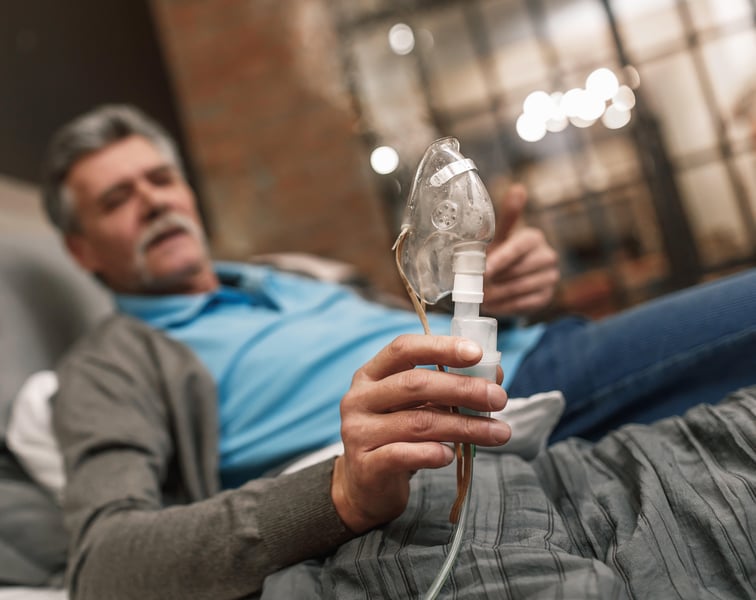Manténgase sano!

- Posted February 15, 2022
Is Sleep Apnea CPAP Useless for Folks Over 80?
It's called CPAP for short, and the treatment helps millions with sleep apnea breathe better at night. But new research suggests it might not make any difference for patients over 80.
"By all the measures we tried, whether it was sleepiness, quality of sleep, blood pressure, depression or anxiety, we found no significant difference between the people [over 80] who used it and the people who didn't," said researcher Dr. David Gozal. He is chair of the department of child health at the University of Missouri's School of Medicine, in Columbia, Mo.
Often, untreated sleep apnea can lead to high blood pressure, heart trouble, depression or anxiety. Studies have shown that continuous positive airway pressure (CPAP) can significantly reduce sleepiness and depression, and prevent high blood pressure, the researchers noted.
It's not clear why CPAP didn't help these older patients, Gozal said. It's possible that people over 80 have disturbed sleep due to other reasons or conditions that aren't caused by sleep apnea. For example, CPAP doesn't treat high blood pressure not caused by apnea, he explained.
Also, these older patients may have developed other ways of coping with conditions like depression and anxiety that make treating sleep apnea unnecessary, he added.
For the study, Gozal's team followed nearly 370 patients with sleep apnea who were over 70 years of age and were assigned to CPAP therapy or no therapy for three months.
The investigators found that among patients over 80, CPAP did not have much effect on sleep apnea. Although patients using CPAP had significantly improved snoring and witnessed apnea, there were no improvements in apnea-related symptoms, such as depression, anxiety or blood pressure levels.
Gozal suggested that the study may have shown benefits from CPAP in some older patients if it had continued for longer than three months. He said that ongoing trials might answer that question in the future.
Whether an older patient with sleep apnea should try CPAP is a personal choice, Gozal noted.
"Try it. If it works for you and you feel better, great, use it. But if it's really damaging your quality of life, and you feel that it's really affecting everything else that allows you to enjoy your golden years in the best possible way, you can make that decision to use it or not," he said. "It's ultimately a patient's decision, and we have to respect it."
The findings were published recently in the journal Sleep Medicine.
Dr. Harly Greenberg, chief of the division of pulmonary, critical care and sleep medicine and medical director of the Northwell Health Sleep Center in New Hyde Park, N.Y., said he doesn't consider these findings conclusive.
"The results did not demonstrate statistically significant improvement between the CPAP and no-CPAP groups," Greenberg said. "Severely sleepy patients, as well as those with respiratory disorders that resulted in low oxygen levels, were excluded from the trial. Conceivably, these patients may be the ones most likely to benefit from CPAP."
Also, sleep apnea affects patients in different ways, so a "one-size-fits-all" approach to therapy isn't the best, he noted.
"Rather, a personalized medicine approach to sleep apnea therapy may be more effective," Greenberg said. "Some patients in this trial achieved improvement in daytime sleepiness with CPAP, even though the average difference between the treatment and no treatment groups did not reach statistical significance."
Greenberg added that patients who have troubling sleep apnea that includes disturbed and non-restorative sleep, daytime sleepiness with impairment in function, and heavy snoring or gasping during sleep should be offered CPAP.
"If there is no improvement in symptoms, discontinuation of therapy can be considered. However, many elderly sleep apnea patients report quality of life benefits from CPAP therapy. These data should not be construed to deny therapy for these patients," he said.
More information
For more on sleep apnea, head to the American Sleep Apnea Association.
SOURCES: David Gozal, MD, chair, department of child health, University of Missouri School of Medicine, Columbia, Mo.; Harly Greenberg, MD, chief, division of pulmonary, critical care and sleep medicine, medical director, Northwell Health Sleep Center, New Hyde Park, N.Y.; Sleep Medicine, January 2022








